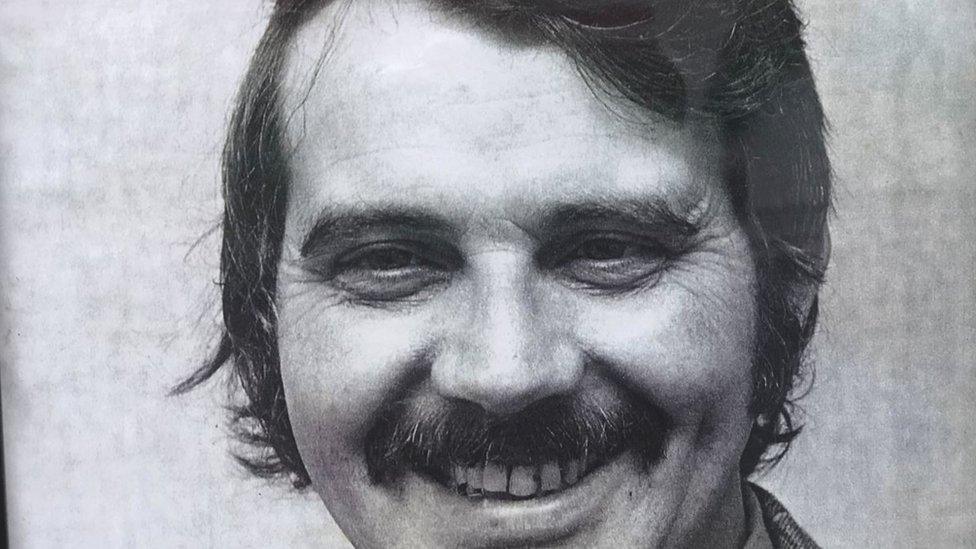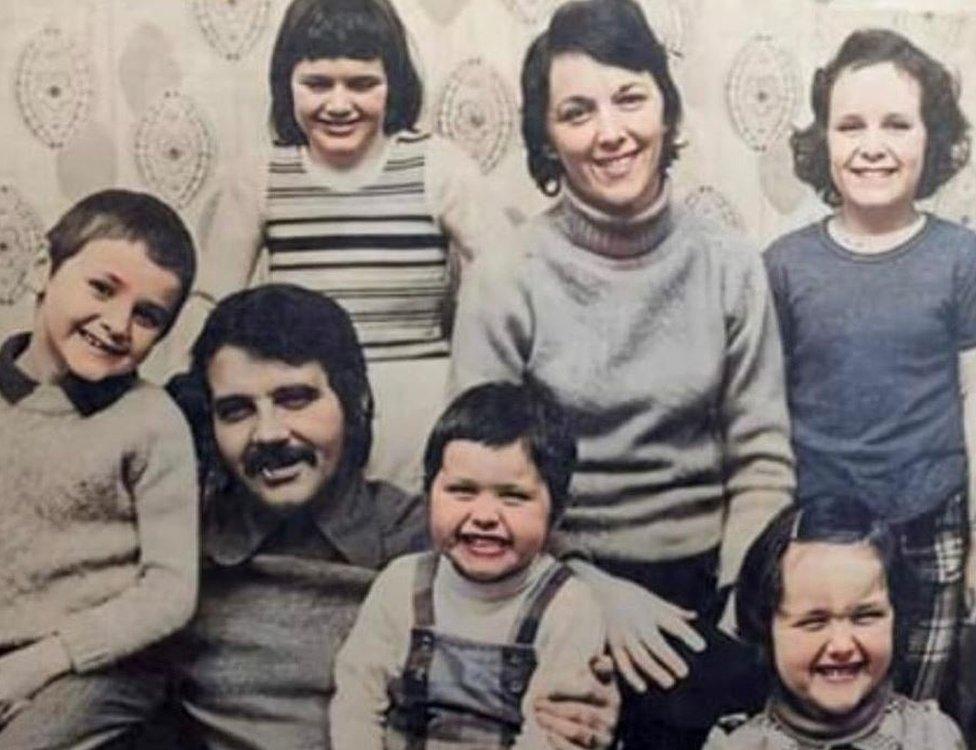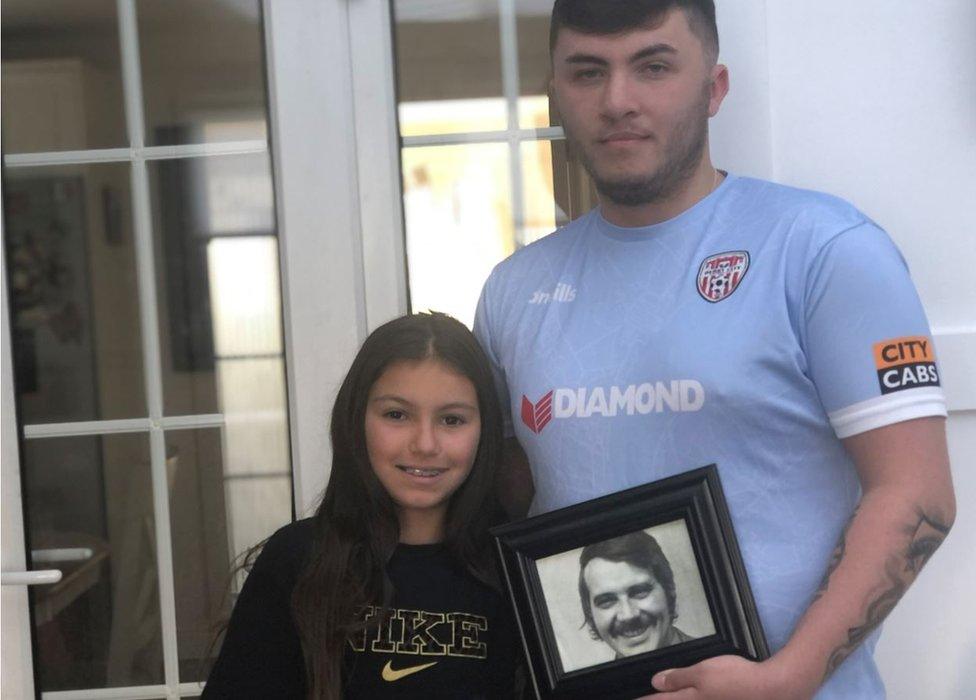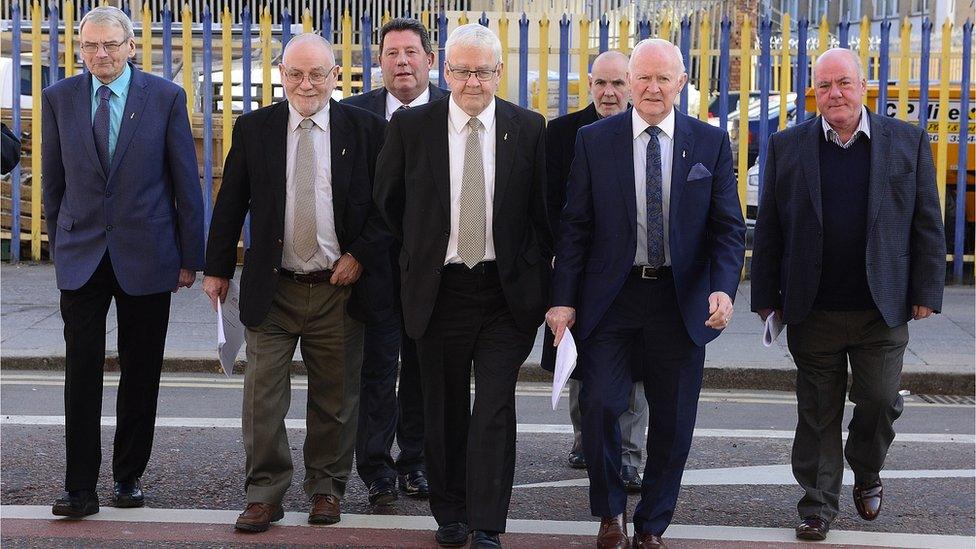Hooded Men: Grandson tells of 'unbearable' effects of torture
- Published

Michael Montgomery was one of the Hooded Men
"What my grandad went through is unbearable to think about."
Oran Montgomery never met his grandfather Michael but he has learned much about his life from reading about him in books.
He has also built up a picture of what he was like from family memories and the many photographs that are dotted around the family home.
Michael Montgomery was one of 14 people - known as the Hooded Men - who were arrested at the height of the Troubles under the policy of internment - or detention without trial.
He was arrested and taken from his home in Creggan in Londonderry in August 1971 after a night out with his wife, Doris.
His family said he returned a different man who never talked about what had happened to him.

Michael Montgomery pictured with his family following his release in 1971
During their detention, the Hooded Men said they were beaten and deprived of sleep, food and water.
They were exposed to white noise and forced to stand in the stress position.
In 2019, the High Court ruled that the techniques the men were subjected to would be characterised as torture by today's standards.
In 2021 the Supreme Court said the men's treatment was "deplorable" and was "deliberate policy".
Oran Montgomery, 22, said the events of 1971 continued to affect his family more than 50 years on.
"It's terrible, what happened to my granddad, and to this day it still brings so much sadness," he told BBC Radio Foyle's The North West Today programme.
"My mother, other members of my family, they can't even talk about it.
"The effect of what happened has rippled through our family - it's crazy how it can continue through so many years.
"To think about the torture my grandfather went through is unbearable".
Michael Montgomery was elected as a republican councillor to the then Londonderry City Council in 1973.
He died in 1984 from a heart attack. He was 48 years old.

Michael Montgomery's grandson Oran Montgomery with Michael's great-granddaughter Aria
On Monday, the Police Service of Northern Ireland (PSNI) issued an apology to the Hooded Men over their treatment under interrogation.
Oran said the family accepted the PSNI apology but it had come "too late" and he often thought about the life his grandfather might have led if he had not been interned.
"From what I've learned about my grandfather growing up, I know he would be the forefront of the campaign for justice for the Hooded Men," he said.
"I'm sure he would have welcomed the apology from the PSNI. All we need now is an apology from the British government and the Ministry of Defence."
A UK government spokesperson said it acknowledged the "pain and suffering felt by so many during the Troubles".
"There are several ongoing legal proceedings in relation to this incident, and therefore it would be inappropriate to comment further at this stage," they added.
Oran said he felt a sense of responsibility to the grandfather he never met.
"I really would have loved to have met him and what I do know about him was that he was a brilliant man," he said.
"He could have gone on to lead a long and great life.
"I know he would have fought on for justice."
What happened to the 'Hooded Men'?
In 1976, the European Commission of Human Rights ruled that the five techniques used on the men amounted to torture.
This ruling was later referred to by the European Court of Human Rights in 1978, which held that the UK had carried out inhuman and degrading treatment, but fell short of defining it as torture.
In 2019, Lord Chief Justice Sir Declan Morgan, Northern Ireland's most senior judge, said their treatment "would, if it occurred today, properly be characterised as torture".
He said the ruling later by the Supreme Court in 2021 was "unbelievable", but that it was tinged with sadness that some of the Hooded Men did not live to witness it.
Related topics
- Published15 December 2021

- Published13 June 2023
